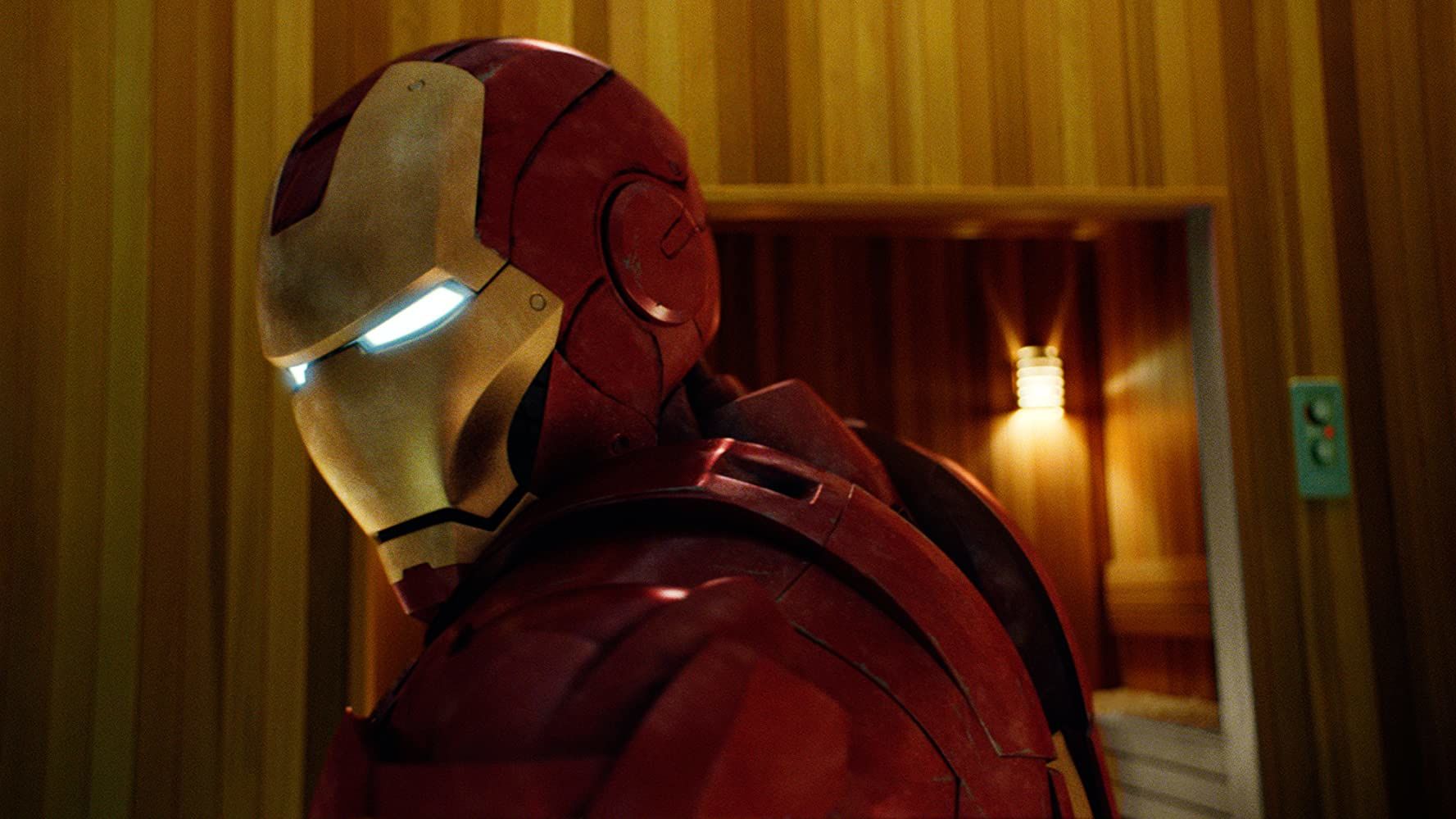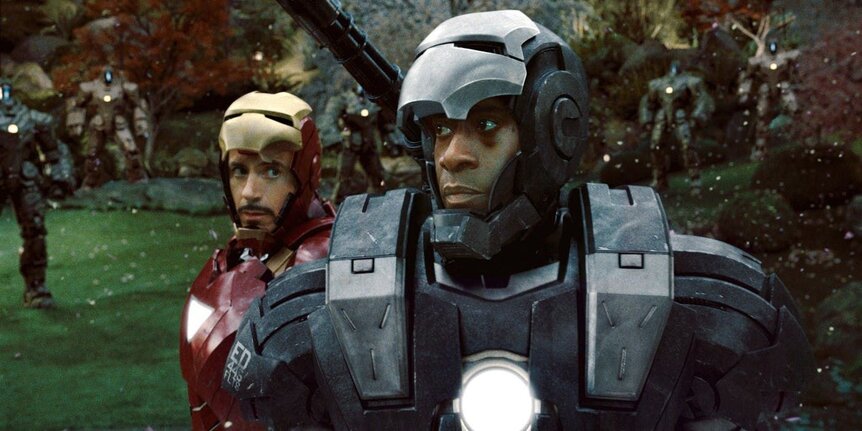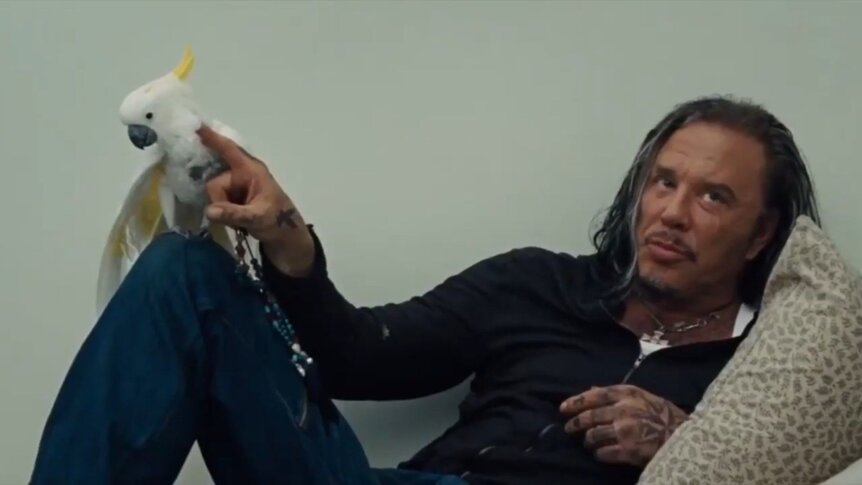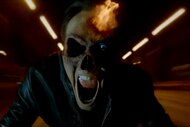Create a free profile to get unlimited access to exclusive videos, sweepstakes, and more!
10 years later: Iron Man 2, a perfectly imperfect movie, changed the MCU forever

Iron Man 2 isn’t Marvel Studios’ worst sequel, but it is its most disappointing one. Pick a reason to feel let down, because there are many (the offensive and shockingly gleeful way Tony Stark and Happy ogle Tony’s then-assistant and future Avenger, Natasha Romanoff, comes to mind). At the same time, though, this noble creative misfire — which is celebrating its 10th anniversary today, May 7 — helped change the future of the very franchise it was on the ground level of.
Coming off 2008’s landmark blockbuster Iron Man, which overperformed at the box office and launched the Marvel Cinematic Universe, the expectations couldn’t have been higher for director Jon Favreau and star Robert Downey Jr.’s 2010 follow-up. The sequel was the summer movie equivalent of spinning plates: It had to pit Tony Stark against villains Whiplash (an over-the-top Mickey Rourke) and Justin Hammer (Sam Rockwell), introduce two new characters — Don Cheadle’s Rhodey (sorry, Terrance Howard) and the welcome game-changer Black Widow (Scarlett Johansson) — and lay track for the MCU’s never-before-attempted level of serialized storytelling on the big screen. (Iron Man 2 also sets up Thor in its end-credits scene.) Despite Favreau’s best efforts and an always-engaging RDJ leading a very compelling ensemble cast, Iron Man 2, unfortunately, fell significantly short of the creative and entertaining highs established by its predecessor.
But the creatives and Marvel did not let that detour them. If anything, it emboldened them to “plus” their efforts — a term Marvel Studios head Kevin Feige likes to use. In fact, soon after the film came out — and even as it was shooting — the filmmakers were (often shockingly) honest and candid about the less-than-ideal circumstances surrounding the production.
Granted, the first Iron Man was produced under similar circumstances. Co-star Jeff Bridges called it a “student film,” given how he and the cast would arrive on set in 2007 to shoot and not know what they would be filming that day. But there was a completed script to work with, and years of development, to serve as a fallback or touchstone for Iron Man, whereas Iron Man 2 had less than two years to go from script to theaters.
As a result, the rushed production feels unmoored and in free fall (ironically) from the jump — with a key opening sequence involving Tony, in his armor, jumping out of a plane to make a hell of an entrance at the Stark Expo to the tune of AC/DC's "Shoot to Thrill."
The sequel’s lack of a completed script explains the patchwork-y feel, as the movie often feels like it is being held together and propelled solely by the sheer momentum of Downey Jr.’s and the rest of the cast’s improvisations — with its star seemingly overcompensating with his now-trademark off-the-cuff contributions. Iron Man 2 doesn’t so much reach creative “flow” or a uniform theatrical experience as it lurches from set piece to set piece, making pit stops in Tony’s character arc — one in particular about finding who he is in the long, inescapable shadow of who his father was — that feel half-baked or fiercely course-corrected via reshoots. (The jarring tinkering and use of too many exposition scenes and ADR’d lines to help bridge certain narrative gaps resulting from the incomplete script further contribute to the movie’s extra creaky, figuring-it-out-as-it-goes-along feel.)
“With the second Iron Man,” Downey Jr. told the Los Angeles Times in 2011, “there were certain aspects that were dissatisfying and disappointing to me — but at least they lit me right.”
Not the most glowing review from its star, but an apt one.
Iron Man 2 seems to be constantly struggling, like its main character, with figuring out what it wants to be in the presence of some very unenviable shoes to fill — or exceed. The end result stumbles in ways you notice but kinda sorta go along with because of the sheer momentum of the editing and RDJ’s pathological inability to deliver anything but an entertaining performance. The bumpy narrative also under-services Cheadle and Johannson’s characters, who would (thankfully) become more integral and better integrated into the MCU in future films. But what few moments Cheadle has firmly establish him as the definitive Rhodey; his chemistry with RDJ is endless, and the actor’s comedic timing rivals that of his co-star. And Johansson invests her character with more depth than what is on the page with her commanding screen presence, along with her deft execution of Black Widow’s signature fighting style. (And it’s impossible not to give Sam Rockwell significant care space for his performance as Hammer, one of the MCU’s most underrated villains.)
All of this rockets to the climactic moments of the film, in which Iron Man and War Machine defeat a mech’d-out Whiplash by basically high-fiving their repulsor rays. (A far cry from the satisfying showdown between Tony and Iron Monger in the first film.) From here, the movie further tees up Nick Fury’s Avengers Initiative, using a rocky second installment of Marvel’s first franchise as a stepping stone to its flagship one. In doing so, with the benefit of hindsight, audiences can spot how Iron Man 2’s less-than-stable end product helped forge one of the most stable and durable movie franchises in history.
Iron Man 2 was released at a critical time for Feige’s ambitious Phase One plan. The sequel wasn’t the creative or crowd-pleasing success that the first film was, but Iron Man 2 was a necessary stumble on the way to “perfecting” the Marvel mold. It didn’t torpedo or even come close to grounding this great experiment, as some movie critics and trade reports indicated at the time. If anything, it emboldened Feige and the rest of his team to take more big creative swings and learn from their mistakes, as opposed to assigning blame from them. (Marvel also used the film to shoe-horn in plot threads to set up 2012’s The Avengers while Thor was being filmed, and often these choices were last-minute adds that required the already-nimble production to have to adapt and reconfigure the story to accommodate.)
“It was after the weekend of Iron Man [when it opened to a way-better-than-expected $98.6 million] that we said, ‘Oh, A) we’re going to be able to make more of these movies, and B) we’ll be able to tie them together,’” Feige told Vanity Fair. The goal was to keep making enough cash so Feige and company could keep making Marvel movies. At the time, Marvel was freshly under Disney ownership. While the House of Mouse didn’t have a hand in the development, it did expect Marvel’s big experiment — and the Avengers Initiative — to pay off. In the process, Feige kind of set himself up for the no-win scenario of shaping Iron Man 2 to service more the needs of future films instead of itself. Which is ironic given his quote in a 2012 interview with Wired.
“The secret, the not-so-secret secret, is each individual film is actually more important than the whole of the connected films," he said. "Because, if any one film doesn't work the house of cards comes down.”
Somehow, Iron Man 2 didn’t cause Marvel’s house of cards to fall down — rather, it helped reinforce it.
Iron Man 2 isn’t a terrible movie. It’s just not an especially good one. It is a messy, ambitious production whose grasp was ill-equipped from the onset to ever satisfy its reach.
But it is a great — and necessary — example of the pros and cons of moviemaking on this scale and the many masters one needs to service while making it. Again, this type of filmmaking and storytelling had never been attempted before; Iron Man 2 was beta-testing the future pipeline of Marvel Studios. Attention must be paid and reward must be given for the effort expended and for trying that which hadn’t been done.
Long story slightly less long: Iron Man 2 had to crawl so The Avengers and the rest of the MCU could run... right out of Doctor Strange’s Endgame portals and into movie history.
The views and opinions expressed in this article are the author's, and do not necessarily reflect those of SYFY WIRE, SYFY, or NBCUniversal.




























